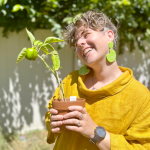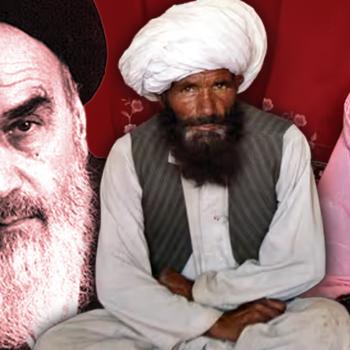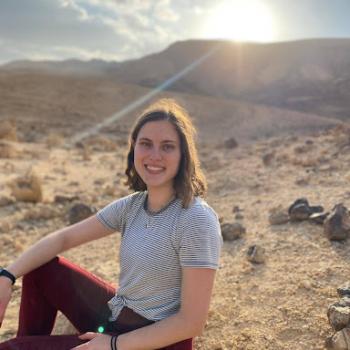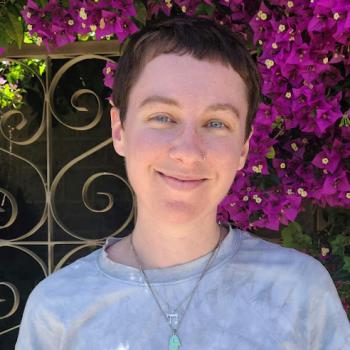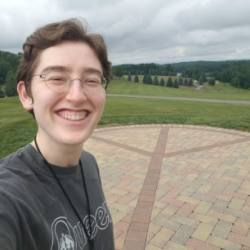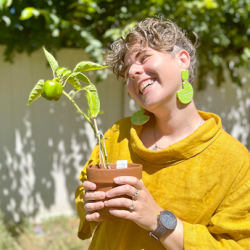By Rabbi Frankie Sandmel
Parashat Vayekhel (Exodus 35:1-38:20)
There is no doubt that this year, 2025, there is work to be doing. For anyone who has read the news recently, regardless of where one falls on the headlines of the day, it is clear being a Jew in the world today means recognizing that there is much work to be done to build the world that we want.
Parshat Veyekhel is all about doing the work. Specifically, it’s about starting the work.
After weeks of learning the detailed pans for the Israelites’ traveling spiritual home, this week they finally set to work gathering materials and volunteering for jobs:
וַיֵּ֥צְא֛וּ כּל־עֲדַ֥ת בְּנֵֽי־יִשְׂרָאֵ֖ל מִלִּפְנֵ֥י מֹשֶֽׁה׃ וַיָּבֹ֕אוּ כּל־אִ֖ישׁ אֲשֶׁר־נְשָׂא֣וֹ לִבּ֑וֹ וְכֹ֡ל אֲשֶׁר֩ נָדְבָ֨ה רוּח֜וֹ אֹת֗וֹ הֵ֠בִ֠יאוּ אֶת־תְּרוּמַ֨ת יְהֹוָ֜ה לִמְלֶ֨אכֶת אֹ֤הֶל מוֹעֵד֙ וּלְכל־עֲבֹ֣דָת֔וֹ וּלְבִגְדֵ֖י הַקֹּֽדֶשׁ׃
So the entire community of the Children of Israel went out from Moshe’s presence, and then they came: every person whose heart uplifted them, and everyone whose spirit volunteered them, brought God’s contribution for the skilled-work on the Tent of Appointment, for all its service [of construction], and for the garments of holiness. (Exodus 35:20-21)
Many of the conversations that fill my days as a rabbi lately center around helping young adults discern their relationship to “the work”. As my community members grapple with the gravity of current events and its impacts on their lives, they are asking “What should I do? How do I know where to start? What do I have to offer?”
Tradition has long derived lessons about our work in the world from the work of the Mishkan — all 39 of our shabbat prohibitions are derived from the work of the Mishkan. So, if the Mishkan can teach about what not to do when we rest, it can also teach about what we should do when we want to work.
In looking at this verse, Ramban, a 13th century Spanish commentator, teaches us that there’s a difference between those whose “heart carried them” and those whose “soul volunteered them”. We’ve already encountered the soul-volunteers earlier in Exodus — Ramban says those are the people who contributed materials. Those whose hearts stirred them, are a new kind of person; they are the ones who volunteered to do the actual labor. To build, to weave, to weld. With regard to them, Ramban writes:
וְטַעַם אֲשֶׁר נְשָׂאוֹ לִבּוֹ, לְקָרְבָה אֶל הַמְּלָאכָה, כִּי לֹא הָיָה בָּהֶם שֶׁלָּמַד אֶת הַמְּלָאכוֹת הָאֵלֶּה מִמְּלַמֵּד, אוֹ מִי שֶׁאִמֵּן בָּהֶן יָדָיו כְּלָל, אֲבָל מָצָא בְּטִבְעוֹ שֶׁיֵּדַע לַעֲשׂוֹת כֵּן, וַיִּגְבַּהּ לִבּוֹ בְּדַרְכֵי יהוה (דה”ב יז ו) לָבֹא לִפְנֵי מֹשֶׁה לֵאמֹר לוֹ אֲנִי אֶעֱשֶׂה כֹּל אֲשֶׁר אֲדֹנִי דּוֹבֵר
Now the reason for using such a phrase, whose heart stirred them up, is because they undertook to do the work, although there was no one amongst them who had learned these crafts from an instructor, or had trained his hands at all to do them. Rather, a person who felt in his nature that he knew how to do such skills, his heart was lifted up in the ways of the Eternal to come before Moses and say to them, “I will do all that my lord speaks.” (Ramban on Exodus 35:21:1)
Put another way: those whose hearts stirred them were those who were willing to approach Moshe and God with vulnerability and humility to say, “I don’t know exactly what to do, and I think I have something to offer,” and then to listen, to learn and to try new skills.
Ramban’s description of those whose hearts stirred them resonated with advice I encountered in trying to have better answers to my community’s questions. In their book, “Let this Radicalize You: Organizing and the Revolution of Reciprocal Care,” Chicago-based organizers Mariame Kaba and Kelley Hayes write,
Rather than recruiting people to fill in roles that we envision for them, [Ejeris] Dixon stresses the importance of learning what people are passionate about and ‘finding an intersection’ between someone’s interests and the work at hand. ‘Relationship building is also a process of hearing what people’s needs and dreams are and creating space for people to collaboratively or collectively take care of each other,’ Dixon said. ‘So I think a lot about starting with asking, ‘what do you want? What do you need? How can I help? Here’s what we’re working on. How does that sound to you? What are we missing? What else is needed?” (47-48)
On the surface, this advice seems like the opposite of what the Torah describes. We were given so many specific roles to fill! But through Ramban’s explanation, the process is much closer to what Dixon describes: as people volunteered, they discerned what they were interested in, what they thought they might be good at, and then worked together with Moshe and God to grow into the work that was right for them. Through this process of following one’s heart, offering one’s service, and being willing to listen and learn, the Mishkan was built. And, just as with the Mishkan, we can start “the work” by humbly asking those around us what they need and what they’re doing. Then we can notice where we feel inspired, what we need, and what we already have. With willingness to try new skills, explore new ideas, and volunteer with openness to the process, we too can contribute our part to the project of building a better world.
Rabbi Frankie Sandmel (they/them), Hebrew College Rabbinical Schoo ‘22, runs Base Bay where, together with their partner Elaina, they are building a vibrant, rooted, and resonant Jewish community for young adults out of their home in Oakland. In their free time, Frankie is a fellow with SVARA: A Traditionally Radical Yeshiva and they bake a lot of cookies.



